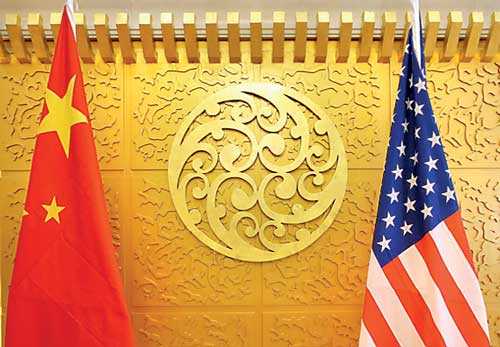Thursday Feb 19, 2026
Thursday Feb 19, 2026
Tuesday, 21 May 2019 00:00 - - {{hitsCtrl.values.hits}}
BEIJING/WASHINGTON (Reuters) - China accused the United States on Monday of harboring “extravagant expectations” for a trade deal, underlining the gulf between the two sides as U.S. action against China’s technology giant Huawei began hitting the global tech sector.
Adding to bilateral tension, the U.S. military said one of its warships sailed near the disputed Scarborough Shoal claimed by China in the South China Sea on Sunday, the latest in a series of “freedom of navigation operations” to anger Beijing.
Alphabet Inc’s Google has also suspended business with China’s Huawei Technologies Co Ltd that requires the transfer of hardware, software and technical services, except those publicly available via open source licensing, a source familiar with the matter told Reuters on Sunday, in a blow to the company that the U.S. government has sought to blacklist around the world.
Shares in European chipmakers Infineon Technologies, AMS and STMicroelectronics fell sharply on Monday amid worries the Huawei suppliers may suspend shipments to the Chinese firm due to the U.S. blacklisting of it last week.
The Trump administration’s addition of Huawei to a trade blacklist on Thursday immediately enacted restrictions that will make it extremely difficult for it to do business with U.S. counterparts.
In an interview with Fox News Channel recorded last week and aired on Sunday night, Trump said the United States and China “had a very strong deal, we had a good deal, and they changed it. And I said ‘that’s OK, we’re going to tariff their products’.”
In Beijing, Chinese Foreign Ministry spokesman Lu Kang said he didn’t know what Trump was talking about.
“We don’t know what this agreement is the United States is talking about. Perhaps the United States has an agreement they all along had extravagant expectations for, but it’s certainly not a so-called agreement that China agreed to,” he told a daily news briefing.
The reason the last round of China-U.S. talks did not reach an agreement is because the United States tried “to achieve unreasonable interests through extreme pressure”, Lu said.”From the start this wouldn’t work.”
China went into the last round of talks with a sincere and constructive attitude, he said.
“I would like to reiterate once again that China-U.S. economic and trade consultation can only follow the correct track of mutual respect, equality and mutual benefit for there to be hope of success.”
No further trade talks between top Chinese and U.S. trade negotiators have been scheduled since the last round ended on 10 May - the same day Trump raised the tariff rate on $200 billion worth of Chinese products from 10%.